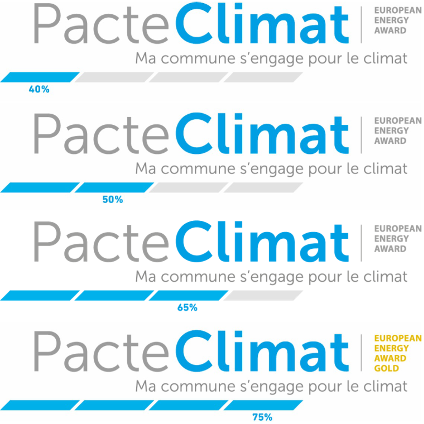Climate change also affects Luxembourg. More frequent droughts, torrential rains and flooding are just some of the changes expected in the near future. Climate action measures can address these changes. By reducing the environmental impact of human actions, climate change can be slowed if not halted.
To monitor progress in climate action, Luxembourg, along with all other Member States of the European Union, has set out ambitious climate action targets in its National Energy and Climate Plan 2021-2030. To help reach the targets, the Luxembourg Ministry of the Environment, Climate and Sustainable Development together with the national agency myenergy has developed a unique tool that supports climate action in municipalities across the country.
Rationale for action
The Luxembourg National Energy and Climate Plan 2021-2030 defines targets to reduce greenhouse gas emissions by 55%, to increase energy efficiency by 40-44% and to increase the share of renewable energy by 25%.
Objective
To help to accelerate the transition, effective instruments are needed to increase renewable energy production and energy efficiency.
At the same time, many climate and energy related decisions are made at a municipal level. So, climate action cannot be implemented without the consent and support of the country’s municipalities. An instrument was needed that would help to identify, structure, fund and communicate measures for climate action convincing municipalities to be primary players in climate action and rewarding their efforts. Thus, the idea for Klimapakt was born.
Time frame
The first edition of Klimapakt supported municipalities between 2012 and 2020. In 2021 a second edition of the instrument is being launched to continue to support municipalities with more ambitious measures until 2030.
Key players
Municipalities are the main target and the main players for implementing climate action measures. The idea for Klimapakt was developed by the Luxembourg Ministry of the Environment, Climate and Sustainable Development and the Luxembourg agency myenergy and is based on the european energy award (eea).
Implementation steps and processes
Klimapakt is implemented through an agreement between the Ministry of the Environment, Climate and Sustainable Development, myenergy and individual municipalities. The agreement equips municipalities with financial and human resources to implement climate action measures. It also requires municipalities to implement measures to benefit from funding provided by the state. This way, municipalities can choose the projects that best fit the local context and the state maintains control over spending and results.
After signing the contract, a climate team is put in place, with local elected officials, collaborators of the municipality (the climate team), local enterprises and citizens as well as an external climate advisor (provided from myenergy) or an internal climate advisor (employee from the municipality). The initial assessment of the municipality and its energy consumption is established by the climate advisor and the climate team. Based on a pre-defined catalogue of measures, municipalities then select individual measures, contribute to increased energy efficiency or reduced energy consumption. These measures are grouped in a work programme.
Depending on the size of the municipality, a climate advisor is available for a number of workdays every year (up to 75 days). In addition to the main climate advisor, municipalities can also book specialized advisors in the fields of circular economy and building renovation.
Klimapakt has 64 measures categorized in six categories, ranging from spatial planning, construction, municipal infrastructure and services, resource management, mobility, internal organisation to communication and cooperation.
Klimapakt measures are based on the framework catalogue of the european energy award and are adapted to the Luxembourg context. This ensures that actions contribute to the European reference framework for local climate actions.
Every measure has a specific number of points, enabling monitoring of progress towards programme objectives. By implementing the measures, municipalities benefit from financial support from the state.

Municipal Klimapakt programmes are monitored every three years and can be certified at 40%, 50%, 65% and 75% progress. At the same time, Luxembourg municipalities are certified with the european energy award system, giving greater international visibility.
Complementing the general framework catalogue from the European energy award, municipalities can also work towards thematic certifications in the fields of circular economy, climate change adaptation and air quality.
Required resources
To implement the measures, municipalities benefit – in addition to the climate advisor – from an annual payment of EUR 10 to 45 per capita based on the number of residents and level of certification.
Results
The success of the initiative speaks for itself. In 2020, each of the 102 municipalities in Luxembourg was engaged in the Klimapakt and 96% of them were certified.
78 of these municipalities were certified at above 50% in 2020, having implemented more than half of the measures of the contract between the state and the municipalities. 13 municipalities even reached the 75% certification level.
By following the european energy award certification, municipalities can also get European level awards at the 75% level. In 2020, thirteen Luxembourg municipalities were awarded the eea ‘Gold’ status for their climate action.
Experiences, success factors, risks
Using a label to certify municipality action has helped to market the Klimapakt approach to the target group. Municipalities are using the label to make their measures visible to residents and to benchmark their efforts against other municipalities. This makes the instrument an important lever to support climate action in the country.
Conclusions
The Klimapakt is not just a technocratic instrument to increase municipal climate action. It has also become a brand in Luxembourg, showing municipality efforts on climate action.
The first Klimapakt, showed the instrument can be an umbrella for climate action. New measures and standards in the upcoming edition will encourage stronger result-orientation and cooperation with citizens through public participation.
Contact
Mr Bruno Barboni, project officer for Klimapakt: bruno.barboni@myenergy.lu
References
Barboni, B. & Faber, F., 2020: Presentation of Klimapakt 1.0 and 2.0 (in Luxembourgish): https://www.pacteclimat.lu/sites/default/files/media-docs/2021-03/myenergy-presentatioun_0.pdf
KlimaPakt, 2021: Measures catalogue (in German and French): https://www.pacteclimat.lu/de/engagierter-akteur/umsetzungshilfe
KlimaPakt, 2021: Library of relevant documents (in German and French): https://www.pacteclimat.lu/de/engagierter-akteur/mediathek





